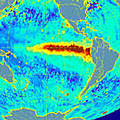 氣候變遷科學家預測2007年可能是在全球紀錄上暖化最嚴重的一年,且打破1998年創下的最新紀錄。英國氣象局科學家大膽預測,已在太平洋海域成形的聖嬰現象,將把全球暖化推向新高點,使2007年成為史上年均溫最高的一年。科學家還預估,聖嬰現象預計會持續到2007年年初前幾個月。
氣候變遷科學家預測2007年可能是在全球紀錄上暖化最嚴重的一年,且打破1998年創下的最新紀錄。英國氣象局科學家大膽預測,已在太平洋海域成形的聖嬰現象,將把全球暖化推向新高點,使2007年成為史上年均溫最高的一年。科學家還預估,聖嬰現象預計會持續到2007年年初前幾個月。
聖嬰現象發威 2007年比往年更熱
所謂聖嬰現象,是指一股持續好幾個月暖洋流,通常在聖誕節前後時間在秘魯外海形成,大約在5、6月間結束。這種在太平洋上劇烈的氣候轉變,已釀成全球性的氣候變化。聖嬰現象造成的氣候變化事件,包括大雨,暴風雨,也有因乾旱造成的野火。
英國氣象局表示,聖嬰現象發生後,經過一段時期,全球地表溫度會開始回應,而今年這段回應的間隔拉長了,顯示聖嬰現象已有擴張的趨勢,因此也勢必會對今年全球氣候帶來大幅度的影響。
根據英國氣象局的預測,2007年將近有60%的可能性,會和以往最熱的年份如1998年時一樣熱,甚而更熱,溫度預計會升高攝氏0.52度,高於1961年至1990年的平均值。
2007年全球溫度,預計會比長期平均溫度的攝氏14度再高出0.54度。英國氣象局的顧問霍普金斯(Katie Hopkins)說:「有新的資訊表示:氣候變化正在全球各地發生。顧問團的工作就是將英國氣象局氣候變化的研究應用在商業上,以緩和產業界將遭遇的風險,並發展出一套能成功適應新環境的策略性基準。」
英國氣象局會在每年一月發布當年度全球地表溫度的預測報告。這份報告考慮到的升溫因素包括太陽活動、聖嬰現象與溫室氣體濃度等。在過去7年內,該單位每年預測報告的準確度均通過事實考驗,誤差值僅在攝氏0.06度內。
史上最熱溫度 英格蘭2006年率先經歷
英國氣象局最新的氣象報導指出,2006年是歷年來全英格蘭最熱的一年。東英格蘭大學(East Anglia)氣候研究單位教授瓊斯(Phil Jones)於2006年指出,「2006年英格蘭中部歷經自1659年有記錄以來最高的平均溫度,而且比起我們曾經體驗過最熱的那二年要明顯熱了許多。」
儘管一些科學家仍矢口否認人類燃燒煤炭、石油和天然氣等行為,是造成全球暖化的直接因素,仍有許多人正努力找尋更多相關的證據。氣象局氣候科學家帕克(David Parker)指出:「以英國的氣溫來說,2006年是相當異常的一年,好幾個高溫紀錄均被打破。根據奧克拉荷馬大學教授卡羅利(David Karoly)和本局史考特博士(Peter Stott)所展示的研究圖表,人類行為和全球暖化的趨勢之間的確存在關聯性。」
甫於2006年9月發表的最新研究顯示,在太平洋、以及「孕育颶風」的大西洋,海面溫度均有所上升,這不太可能只是單純的自然因素。
在該項研究中,美國勞倫斯利福摩爾國家實驗室(Lawrence Livermore National Laboratory)聯合東英大學氣候研究中心(Climatic Research Unit)等10個研究中心,使用22個不同的電腦氣候系統模型,顯示出20世紀間熱帶大西洋和太平洋的暖化與人類活動有直接關聯。
該論文的主要作者,利福摩爾國家實驗室氣候模型交叉比對計劃主持人沙特(Benjamin Santer)指出,「在現實世界中,我們正在進行一場燃燒石化燃料和排放溫室氣體的失控實驗。」他接著說:「最終的結論是,在颶風孕育溫床上的海洋表面溫度升高趨勢,並不能光用自然現象來解釋,造成這些變化的原因必須包含人類所加諸的大幅影響。」
聯合國警告應立刻採取行動
2006年11月的聯合國氣候變化會議上,聯合國糧農組織(FAO)官員一開始即指出,全球暖化的影響似乎逐漸蔓延開來,氣候變遷將直接影響未來食物的取得,而且要讓全球急速增加的人口得到溫飽將更加困難。FAO肯亞代表卡瑪拉達(Castro Paulino Camarada)在會議中針對科學和技術團體的一場演說中指出:必須加強關注氣候變遷對於農業、林業和漁場所造成的衝擊,並以緩和及漸進措施來因應。
上升的海平面淹没濱海村落,熱帶疾病向北擴散蔓延,以及冰層的融解造成物種的瀕危,都被列為氣候變遷效應影響範圍。
在聯合國氣候變化會議中,綠色和平組織氣候能源政策顧問沙耶(Steve Sawyer)表示:「我們可以阻止氣候變遷的最壞衝擊,但惟有政府現在立刻展開行動才行。如果我們還是拖拖拉拉的話,後世子孫永遠也不會原諒我們。」
Climate change scientists predict that 2007 is likely to be the warmest year on record globally, beating the current record set in 1998. Calling it a "startling forecast," scientists at the British Meteorological Office say the potential for a record 2007 arises from an El Nino warming pattern already established in the Pacific.
The El Nino is expected to persist through the first few months of 2007. An El Nino is a warm ocean current that typically appears around Christmas time off the coast of Peru and lasts for several months, but may persist into May or June.
The huge temperature shift in the Pacific Ocean spawns climate changes globally. El Nino climatic events include heavy rains and blustery storms as well as drought with associated wildfires.
The lag between El Nino and the full global surface temperature response means that the warming effect of El Nino is extended, therefore it has a greater influence on global temperatures during the year, the Met office said.
There is a 60 percent probability that 2007 will be as warm or warmer than the current warmest year, which was 1998. Temperatures are expected to rise +0.52 degrees Celsius, above the long-term 1961-1990 average, according to the Met office forecast.
The global temperature for 2007 is expected to be 0.54 °C above the long-term average of 14.0 °C. Katie Hopkins from Met Office Consulting said, "This new information represents another warning that climate change is happening around the world. Our work in the climate change consultancy team applies Met Office research to help businesses mitigate against risk and adapt at a strategic level for success in the new environment."
Each January the Met Office issues a forecast of the global surface temperature for the coming year. The forecast takes into account contributing factors, such as solar effects, El Nino, and greenhouse gases concentrations.
Over the previous seven years, the Met Office forecast of annual global temperature has proved accurate, with a mean forecast error size of just 0.06 °C.
Thursday's forecast follows news that 2006 was the warmest year on record across the UK.
Professor Phil Jones of the Climatic Research Unit at the University of East Anglia, said of 2006, "This year sees the highest average temperature recorded since the Central England Temperature series began in 1659, and the rise above the average is significantly higher than that for the two hottest years we have experienced."
While some scientists still deny that human activities such as combustion of coal, oil and natural gas are responsible for global warming, others are finding more evidence of such links.
Met Office climate scientist David Parker said, "2006 has been quite extraordinary in terms of the UK temperature, with several records being broken. The figures support recent research from Professor David Karoly of the University of Oklahoma and Dr. Peter Stott at the Met Office, which showed links between human behavior and the warming trend."
New research published in September shows that rising sea surface temperatures in hurricane "breeding grounds" of the Atlantic and Pacific Oceans are unlikely to be purely natural in origin.
Using 22 different computer models of the climate system, atmospheric scientists from Lawrence Livermore National Laboratory in the United States and 10 other research centers, including the Climatic Research Unit, demonstrated that the warming of the tropical Atlantic and Pacific oceans over the last century is directly linked to human activities.
"In the real world, we're performing an uncontrolled experiment by burning fossil fuels and releasing greenhouse gases," said Benjamin Santer of Livermore's Program for Climate Modeling and Intercomparison, and lead author of the paper.
"The bottom line," said Santer, "is that natural processes alone simply cannot explain the observed sea surface temperature increases in these hurricane breeding grounds. The best explanation for these changes has to include a large human influence."
The effects of global warming are likely to be extensive. Climate change will directly affect future food availability and compound the difficulties of feeding the world’s rapidly growing population, an official of the UN's Food and Agriculture Organization said at the opening of a UN climate change conference in November.
In an address to the conference’s scientific and technical body, Castro Paulino Camarada, FAO representative in Kenya, stressed that greater attention must be given to the impact of climate change on agriculture, forestry and fisheries, and on mitigation and adaptation measures.
Rising sea levels that could flood coastal communities, the spread of tropical diseases northward, and the extinction of ice dependent species are all projected as effects of climate change.
At the same UN conference, Steve Sawyer, Greenpeace climate and energy policy advisor, said, "The worst impacts of climate change can be prevented, but only if governments act now. Future generations will not forgive us if we delay."


